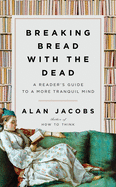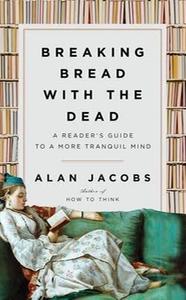
 The third volume in a series that includes How to Think: A Survival Guide for a World at Odds and The Pleasures of Reading in an Age of Distraction, Baylor University humanities professor Alan Jacobs's Breaking Bread with the Dead: A Reader's Guide to a More Tranquil Mind makes a gentle, yet insistent, argument for the "value of paying attention to old books that come from strange times and are written in peculiar language and frankly don't make a whole lot of sense."
The third volume in a series that includes How to Think: A Survival Guide for a World at Odds and The Pleasures of Reading in an Age of Distraction, Baylor University humanities professor Alan Jacobs's Breaking Bread with the Dead: A Reader's Guide to a More Tranquil Mind makes a gentle, yet insistent, argument for the "value of paying attention to old books that come from strange times and are written in peculiar language and frankly don't make a whole lot of sense."
Jacobs locates what he calls our "sense of defilement"--the idea that consorting with thinkers of the past somehow makes us unclean--in two contemporary phenomena: information overload and social acceleration. Together, these unfortunate features of life in the Internet age require a "rough-and-ready kind of informational triage" that compels us to "learn to reject appeals to our time, and reject them without hesitation or pity." The antidote for this affliction is the quality of "temporal bandwidth," a term he borrows from Thomas Pynchon's novel Gravity's Rainbow, suggesting that by widening our present, engaging constructively with the past is a way of "simultaneously slowing us down and giving us more freedom of movement. It is a balm for agitated souls."
For a slim volume, one he wryly refers to as a "self-help book," Jacobs marshals an impressive body of evidence from writers as diverse as Horace and Zadie Smith to craft his argument for sympathetic engagement with sources whose ideas may seem strange, or even repulsive, as in the case of Edith Wharton's anti-Semitism in The House of Mirth. By accepting an invitation to the metaphorical meal suggested by the book's title, no matter how awkward it may feel, he argues, we are experiencing "a relatively nonthreatening, and yet potentially enormously rewarding, way to practice encountering difference."
But Jacobs is offering a prescription whose value extends far beyond its usefulness in negotiating the challenges of Twitter wars and Facebook unfriending. One especially powerful story he recounts is that of Frederick Douglass, whose speech on July 4, 1852, simultaneously praised and denounced the legacy of the Founding Fathers--a moving example of one man's frank reckoning with a painful past. It's an especially pertinent illustration at this moment in U.S. history. At a time when many Americans, compelled by tragic events to confront a legacy of racism, are engaged in deep reflection about the meaning of the nation's history, Breaking Bread with the Dead is an exceptionally useful companion for those who want to do so with honesty and integrity. --Harvey Freedenberg, freelance reviewer
Shelf Talker: Humanities professor Alan Jacobs makes a persuasive case for the benefits of reading texts from other times.

